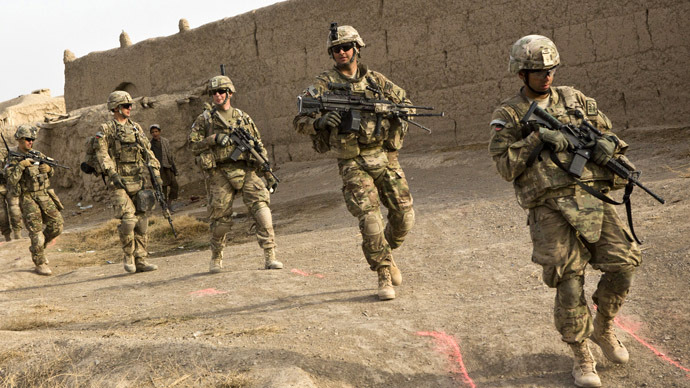More US Troops To Remain In Afghanistan As Violence Spikes
US troops in Afghanistan

NEW DELHI: Outgoing US Defence Secretary Chuck Hagel has said that an addition 1000 US troops will remain in Afghanistan next year, putting the total number of US troops to be left in the country at 10,800.
Hagel made the announcement in Kabul over the weekend, during his last visit to Afghanistan as US Defence Secretary. The increase has been approved by US President Barack Obama, despite an initial decision to limit the number of US troops in Afghanistan to 9800 after the end of the year.
2014 marks the official end of the US mission in Afghanistan, and the US needed the Afghan authorities to sign the Bilateral Security Agreement (BSA) for foreign troops to remain in the country. Former Afghan President Hamid Karzai had refused to sign the agreement, leading to a strain in relations with the US. The agreement was eventually signed with the new President -- Ashraf Ghani, who stood alongside Hagel when he made the announcement for the provision of an additional 1000 troops to remain.
Although Hagel declared that “the president's authorization will not change our troops' missions, or the long-term timeline for our drawdown," there has already been a change in the mission of the troops. It was previously believed that the remaining troops would be limited to training the Afghan military and in counterterrorism measures against the Taliban. However, last month it was revealed that Obama had approved broader guidelines to allow the military to target Taliban fighters.
The announcement comes as Afghanistan sees a surge in Taliban violence.
Most recently, a suicide bomber blew himself up at a crowded funeral in the Baghlan province north of Kabul, killing nine people. A few days before, Taliban gunmen killed three members of a South African family in an attack on a foreign guesthouse in Kabul-- the third such attack on a foreign guesthouse within a span of 10 days. Other recent attacks include an attack on a British convoy that killed six people and injured 35 others in the capital city, a suicide attack on a guest house belonging to the International Relief & Development (IRD) organization, a roadside bomb in Kabul that injured seven Afghan National Army personnel, and a bombing on the Pakistan-Afghanistan border that killed sixty-one and injured fifty others.
A few weeks ago, on the same day that an agreement was reached in Afghanistan’s parliament to allow for US and NATO troops to remain in the country post 2014, a suicide bomber detonated his vest packed with explosives at amid a crowd of people who had gathered to watch a volleyball match, killing 45 in the attack in Paktika province.
The week before, two days after Taliban fighters killed two security guards on the eastern outskirts of Kabul, officials say that they killed four Taliban suicide bombers during an attack on a compound housing foreign workers in the capital city.
A few weeks before, a convoy of vehicles belonging to American-led coalition forces was attacked twice by Taliban gunmen. Although the convoy suffered no casualties, an Afghan civilian died in the attack. A few days before that in the same week, two separate bombings killed at least ten police officers, including a top commander. The bombings, in turn, followed an attack on the police headquarters in Kabul a day earlier that killed a senior police officer and injured six others. The explosion reportedly happened two hours after another explosion in Kabul, with news reports from the region quoting Defence Ministry Spokesman Mohammad Zahair Azimi saying that the earlier attack was on an Afghan army vehicle that resulted in no casualties.
Earlier, in October, six police officers and two civilians were killed in two separate attacks on the same day, a day after members of the Taliban ambushed a police convoy, leading to an hours-long gun battle in northern Afghanistan. Before that, in the same month, Taliban insurgents killed 22 security force members in Sar-e-Pol province north of Kabul, which in turn, followed a bomb in Kabul on the same day that killed one civilian.
A few weeks ago, although not claimed by the Taliban, a prominent female politician -- Shukria Barakzai -- narrowly escaped a suicide attack that killed three others.
Other recent attacks -- leading up to and during the Presidential elections -- include an attack that killed three soldiers belonging to the United States-led International Security Assistance Force (ISAF) in September, a suicide bombing that killed Karzai’s cousin Hashmat Khalil Karzai, the shooting of 15 civilians, two Finnish relief workers, an attack on the Kabul airport, and one of the deadliest attacks since 2001 wherein a sports utility vehicle detonated in a busy market in Paktika province, eastern Afghanistan, that killed 90 people.



